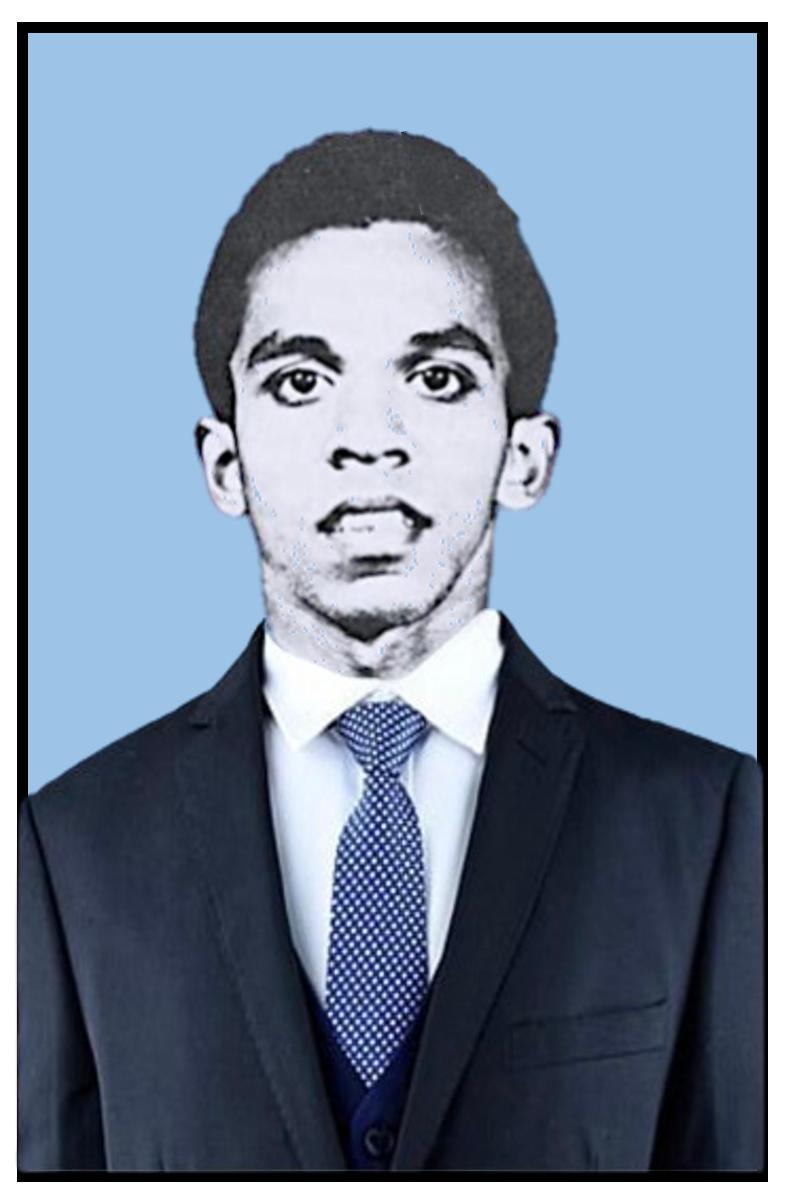REMEMBERING G. S. KRISHNAN
G. S. SANTHANAM KRISHNAN (1945 – 1975)
Some people are like shooting stars. They brightly illuminate the sky for a short period and capture the attention of everyone before quickly disappearing and not to be seen anymore. Mr. G. S. Santhanam Krishnan of Singapore was one such exceptional soul. He occupies a unique place in the annals of the Faith. He arose to pioneer even before signing the Bahá’í declaration card which was a formality in those days in Singapore. And he pioneered and buried his bones in a country totally unknown to him. His life as a Bahá’í on this earthly plane lasted merely four years. But his life was that of pure love for Bahá’u’lláh and shall continue to inspire the current generation and generations yet to be born.
ACCEPTANCE OF THE FAITH
Krishnan accepted the Faith in the most dramatic circumstances, perhaps circumstances that he alone had encountered. Krishnan grew up to be a devoted Hindu in Singapore, spending much time in prayers. He embarked on his career as a medical representative. It was during the first week of January 1971 that the Faith unexpectedly wafted over him, filling him with its profound essence. The highly historical Oceanic Conference of the South China Seas was held at the Victoria Memorial Hall, Singapore from 1 to 3 January 1971. The official representative of the Supreme Body for this conference was Hand of the Cause of God Mr. Enoch OIinga. Also present was another Hand of the Cause Mr. Collis Featherstone. One of the sessions of the conference was a public talk by Mr. Olinga on the topic of ‘A Ray of Hope’. As the momentous talk was about to commence, Krishnan found himself wandering the grounds of the Victoria Memorial Hall which was the venue of the Conference. What brought him to that street on that fateful day was undoubtedly the irresistible spiritual magnetism of the Faith that was pulling him in that direction. As we can see later in this story, Krishnan was one of the chosen ones to play a vital role that shall be forever remembered in history.
As he was walking, a banner that read, “Bahá’í Faith Unites Mankind – All Are Welcome” drew his attention. As soon as his eyes fell on this banner, his heart leaped and skipped a beat thinking if it’s ever possible to unite mankind and what this Bahá’í Faith is all about. Since the banner said all are welcome Krishnan spontaneously entered the conference hall, where he was greeted by believers who showed him where to be seated.
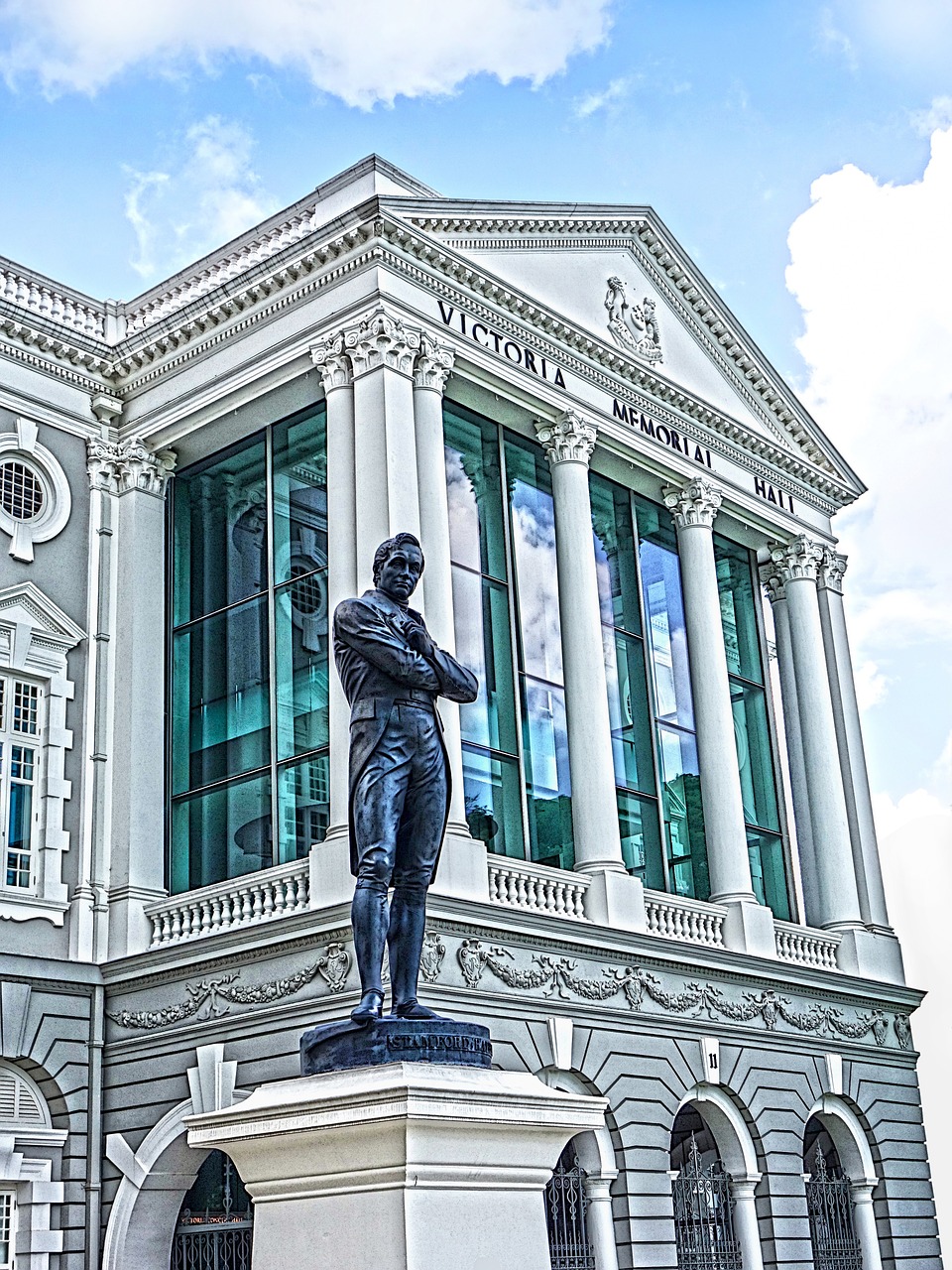
Victoria Memorial Hall, venue of the Oceanic Conference. (Photo credit: needpix.com)
In the conference hall, surprise after surprise greeted him. Singapore is an island country of several races. But here, he was able to see a gathering of the most colourful races that he had never seen under one roof. Beyond that, he saw a new spirit permeating the hall. He witnessed the conference participants consorting with each other with the most loving spirit, as more than members of one family. He was very curious to know what the gathering was all about. Just then Mr. Olinga gave a soul-stirring talk on the need for religion today and drew attention to the Bahá’í Message that provided the solutions for the failing world of today. Mr. Olinga mentioned that the foundation of all religions are one. He said there should be equality between men and women. He also mentioned the need to have universal peace. Krishnan loved and agreed to whatever Mr. Olinga spoke. His talk created a penetrative influence on Krishnan. He was simply spellbound listening to every word emanating from the speaker. He immediately took a tremendous liking for the Faith, as everything that was being said made perfect sense. He could agree with every principle and teaching of the Faith and thought to himself “This is very logical and I can accept all of these”. He also witnessed that the crowd consisted of a new race of men who seemed to be putting into practice whatever the speaker said. The spirit in the hall was so electrifying that he decided to return the following day to listen to more on the teachings of the Faith. When the conference ended, he went home with his thoughts and soul deeply stirred. That night, sleep eluded him, and he eagerly awaited daybreak to return to the conference hall to further quench his thirst after his new spiritual reawakening.
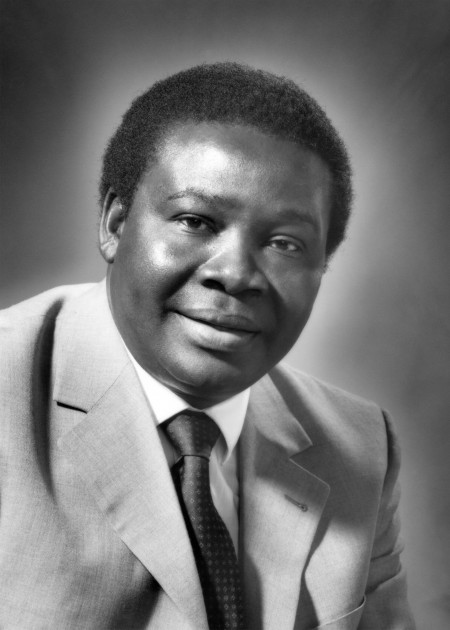
Hand of the Cause of God Enoch Olinga
He arrived there early in the morning, only to find that the banner inviting the public was no more there. Krishnan was so disappointed and broken hearted. Yet he went into the conference hall and spoke to the reception table and asked if the conference had ended. They informed him that the conference was still on and asked him to proceed to the main hall. He was the only one who had arrived without wearing the conference badge. He was surprised the receptionists allowed him into the conference hall without a badge. When Krishnan entered the hall he saw that the crowd was slightly smaller with only Bahá’ís alone present.
There was a thrilling and moving session where Mr. Olinga spoke with words that were thrilling, moving and most convincing. He continued to speak on the teachings but used some terminologies that Krishnan had never heard of. He talked about pioneering and travel teaching, which he did not understand much at that time. Mr. Olinga spoke on the of teaching the Faith through travel teaching and pioneering. First Mr. Olinga called upon a few pioneers in the conference to come on stage and share their experiences in the pioneering field. It was an unexpected and shocking pleasure to see the huge number of pioneers crowding on the stage. Krishnan was further moved to see handicapped believers sharing their experiences, saying being handicapped was no barrier to serving as pioneers abroad. Then Mr. Olinga called for pioneers saying, “If you have the desire to pioneer that is sufficient. Do not worry about your problems. Bahá’u’lláh would guide you … We must be light as the air, not heavy, we must be detached from all things save God.” After he made the call, more than sixty believers came up the stage to volunteer for pioneering, including Mr. Luke Lee Sim Poi, the only blind believer of Malaysia. The crowd focused on him, and Mr. Olinga embraced him with much love and asked him to address the Conference. As Mr. Luke spoke in his mild voice, several friends were moved to tears. Equally moved was Krishnan. When several friends arose to pioneer, Krishnan too spontaneously made his way to the stage. But Krishnan did not know where to go for pioneering and when to leave. As the volunteers went on stage, Mr. Olinga asked them to speak on the microphone and mention their names and say where they intend to go pioneering.
Krishnan had decided to go pioneering but had not decided to which country he had to pioneer. Just then a hand approached him from behind the curtain. A lady pulled him behind the curtain and asked Krishnan who was not wearing the conference badge, “Good that you have volunteered for pioneering. Excuse me. Are you a Bahá’í ?” Krishnan responded without hesitation that he simply agreed to whatever Mr. Olinga was sharing for the past two days. The lady asked him further, “I mean, did you sign in the declaration card?” Krishnan not knowing what that card was all about said “No, what card?”. Signing declaration cards was customary in the past when someone accepted the Bahá’í Faith. The lady took him to a corner and started explaining about the Bahá’í Faith and the Central Figures. Then she asked him “Are you sure you want to become a Bahá’í?” Krishnan replied, “For sure I want to become a Bahá’í”. The lady placed the declaration card in front of Krishnan who immediately filled the card and quickly passed on to her. She congratulated Krishnan and told him, “Now you can go and stand on the line.”
Krishnan proceeded to the stage, waiting for his turn. Mr. Olinga asked Krishnan, “You look like an Indian, are you from India?” Krishnan answered, “Yes. I was born and brought up in Singapore, but my great grandfather is originally from India but migrated to Singapore. Mr. Olinga asked Krishnan, “In that case don’t you think you can go back to India as a pioneer and teach the Faith there?” Krishnan replied in the affirmative. The next question from Mr. Olinga was, “When do you want to go pioneering?” Krishnan spontaneously answered “Now”. As soon as Krishnan gave that answer everybody in the crowd gathered there clapped heartily. He was the only among the volunteers who had given that answer. Krishnan at that time did not know that he could go pioneering at after six months or one year. He thought those who had volunteered to go pioneering had to go immediately and that was the reason he said he was ready to go pioneering immediately. For him, it was absolutely important to share this new found message of love to as many people as he could, and it had to be done immediately.
Immediately after this session all volunteers came down the stage. As Krishnan came down the stage the same lady who had handed over the declaration card approached Krishnan and said, “It is wonderful and so happy that you want to go pioneering right now, but first we will arrange for you some deepening classes for you to learn more about the Faith, after which you can go pioneering. We will arrange crash course for one month before going pioneering to India. So they arranged classes for him in the morning evening, night where he was deepened on the tenets of the Faith with a lot of question- answer sessions thrown in to make sure he understood pioneering in the right perspective. At the end Krishan became more firm in the Faith. It was after being deepened thoroughly that Krishnan went pioneering to India.
Different people are guided into the Faith through different ways. Some come into the Faith after weeks, months or years of investigation. Some enroll into the Faith the moment they hear about the Faith. But here is Krishnan who accepted the Faith the first time he heard of it. And believers used to contemplate, meditate, and go into deep thinking before uprooting themselves to settle in a foreign country as pioneers. But in the case of Krishnan, it was instantaneous. He arose to pioneer even before signing in the declaration card – perhaps unprecedented! At the time of arising to pioneer, Krishnan was not aware of the weighty statements by the beloved Guardian on the importance of pioneering:
“. . he feels there is no service in the entire Bahá’í world as important as their pioneering work in the virgin areas. They have achieved a great station of service. They are the representative of the Faith in these virgin areas. They have the inestimable privilege of bringing the light of Bahá’u’lláh to those hitherto deprived of Divine Guidance for this day. The Guardian has repeatedly pointed out that they can and should become the spiritual conquerors of these new lands.”
(From a letter written on behalf of the Guardian: Messages to Canada, p. 43)
“. . you are the pioneers of a Work that will endure and supersede all the other achievements, however meritorious and brilliant . . .”
(Shoghi Effendi, Japan Will Turn Ablaze, p. 75)
Krishnan did not immediately leave for his pioneering post in India but spent some time in Singapore serving in various capacities until the time came for him to leave for India. Krishnan involved himself actively in local activities.
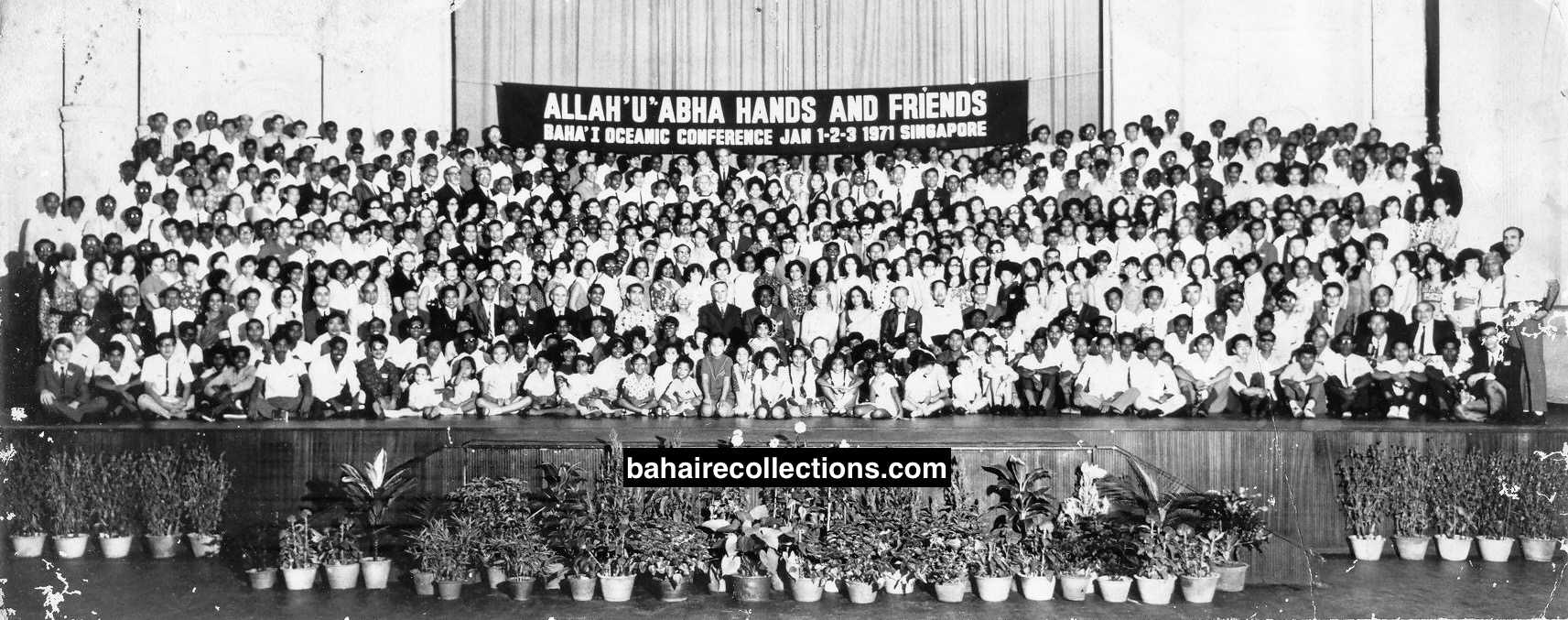
Participants of the Oceanic Conference.
METEORIC RISE
He immediately began to serve the Faith by teaching and working on committees, and he even changed his residence so that he could provide a place for meetings. He served as secretary of the regional Bahá’í Youth Council of Singapore and was its press officer. He was very active and served in the University Teaching Committee and at one point served as the Secretary of the National Teaching Committee. He also volunteered to stay in one of the islands of Singapore, Pulau Tekong Besar, in an attempt to expand the Faith in the island in 1973.
He was on the Local Spiritual Assembly of Katong. He taught the Faith to everyone he met, as he was obsessed with a great passion for teaching. He was teaching with people he met in the course of his work. He joined the youth group and strengthened the youth group. He became highly successful in establishing good relationships between the Bahá’í community and the local press. Krishnan would personally ensure that the Bahá’í Holy Days and other Bahá’í observances were announced. He became an invaluable asset to the community in Singapore.
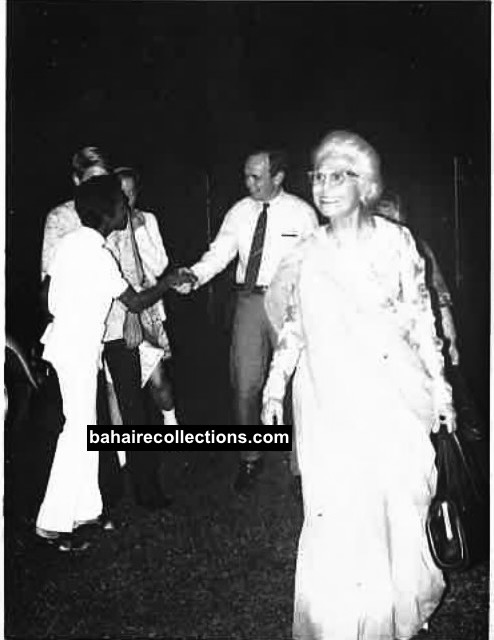
Krishnan at left, welcoming a visitor at a Bahá’í function. At right is Mrs. Shirin Fozdar.
Krishnan was privileged to have attained the presence of the Hand of the Cause of God Jalál Kházeh who came as the representative of the Supreme Body for the first National Bahá’í convention of Singapore held in Riḍván 1972. Krishnan was one of the nine delegates for that National convention. That convention served to deepen and strengthen him further in the Cause, stemming from the soul-stirring talks by Hand of the Cause Jalál Kházeh. Mr. Kházeh was a strict disciplinarian having retired as a Colonel in the Iranian army. He ensured that the convention in Singapore went on by the book. He also called upon all delegates to be seated in the first few rows, and the non-delegates or observers to be separated and seated behind the delegates. Having set the right atmosphere for the occasion, the convention proceeded. Before the election, the writings of the Guardian on “Nature of Bahá’í Elections” were read. After the election, a special message to the community of Singapore from the Universal House of Justice was presented. To Krishnan, the entire atmosphere was truly electrifying. Most important to him was the talks by the Hand of the Cause. He was happy to have taken a group photograph with the Hand of the Cause. He was also happy to see the election of the first national institution in Singapore. The entire convention brought about another transformation in him, as he was able to witness a new kind of electoral process unfolding before his very eyes, unbeknownst to him.
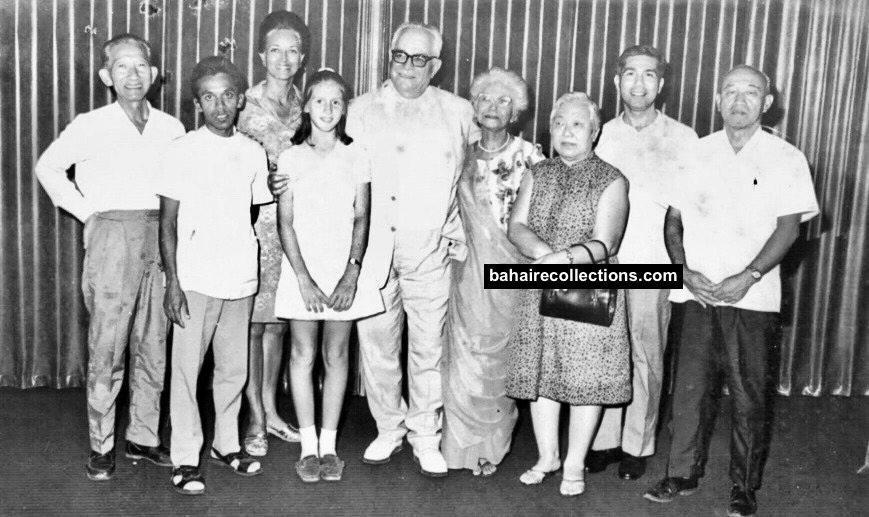
First National Convention of Singapore. (L-R) Mr. Yankee Leong, Mr. S. Krishnan, Mrs. Elizabeth Gibson, Miss Shirin Marion Fozdar, Hand of the Cause Mr. Jalál Kházeh, Mrs. Shirin Fozdar, Mrs. George Lee, Dr. John Fozdar and Mr. Teo Geok Leng.
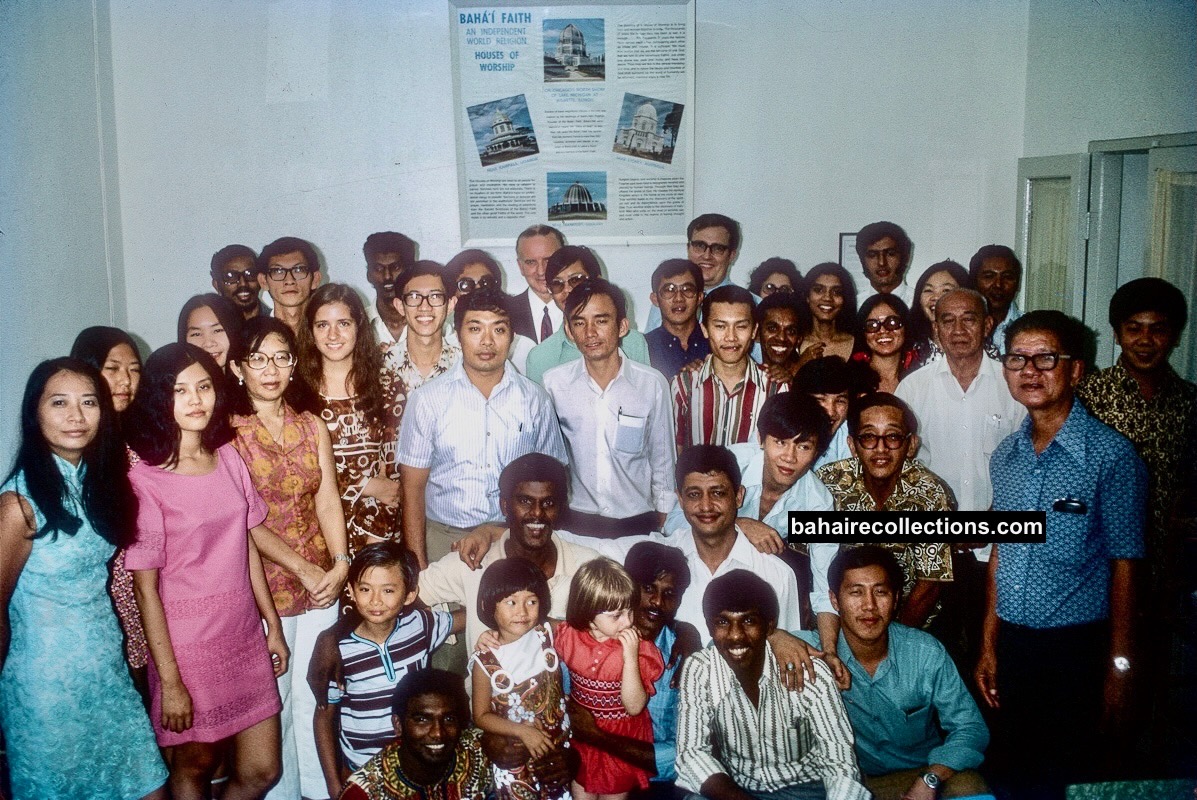
Believers of Singapore and Malaysia at the dedication of the new Singapore National Bahá’í Center, 1973. Krishnan is at the left of the believer with shirt in stripes. Hand of the Cause Mr. Collis Featherstone is at the back centre, partly hidden. (Photo Credit: Gregory C. Dahl)
Although Krishnan was living in Singapore, whenever he visited Malaysia in connection with his employment, he would contact the Bahá’ís and offer his dedicated services. He was very much loved by the believers there. He attended the first Winter School of Malaysia held at the Vocational School in Johor Bahru in December 1972. When there was a call for funds Krishnan did not have much cash with him. He gave away his only camera to be sold and used for the fund. He would deprive himself to give whatever he had to the Bahá’í Fund. He was willing to do anything for Bahá’u’lláh. At this winter school, Krishnan became the center of attraction with his radiant face and ever-smiling nature. After the night sessions were over, some Bahá’ís used to gather at the school canteen for singing sessions. And Krishnan used to come out with some of the old English songs to add to the fun. Observing that Krishnan was eating a lot of bananas, those friends asked him to sing a “Banana song”. That was when he was branded “Banana Krishnan”, a name that lasts till today. When friends made fun of him, he took things with a pinch of salt and never reacted harshly. Although Krishnan was slim and of slight stature, his heart was large. His purity of heart, selflessness, and good humour endeared him to his friends.
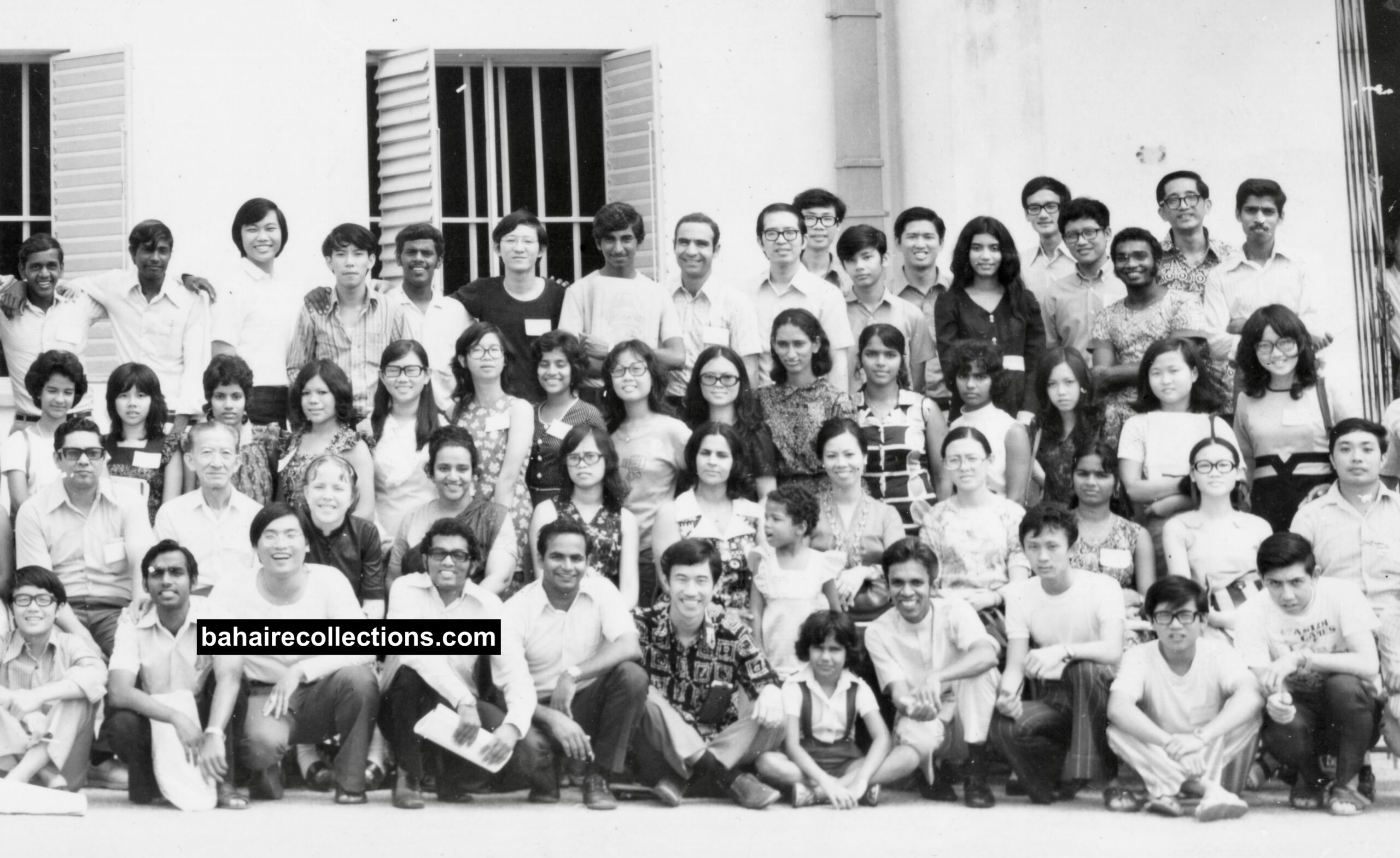
Some participants at the First Bahá’í Winter School held in Johor Bahru, December 1972. The ever-radiant Krishnan is squatting fourth from right.
PIONEERING TO INDIA
The long-awaited moment had finally come. It was in early 1974 that Krishnan set off to pioneer to India. He was excited and elated with the very thought of pioneering. His chosen area of service was Tamil Nadu. As days approached Krishnan, started to empty himself of most of his earthly possessions and was settling all his businesses. He had a huge collection of colorful bow ties which he gave away to friends. As an avid reader, he had a huge collection of books to give away. He had many books on socialism and related topics. He had been very conscious of the plight of the poor, inequalities in society, and the rights of workers. He was searching for answers, but it was anyone’s guess that he did not find what he was looking for in those ideologies. When he heard about the Faith and the teachings, he was all prepared for and after his long search, he found the answers.
When he went to India, he went with only a hand-carried suitcase with some clothes. He travelled light. His arrival in Chennai, the capital of Tamil Nadu coincided with the visit by Mrs. Gloria Faizí, wife of Hand of the Cause of God Mr. Abu’l-Qásim Faizí. She came for the proclamation of the Faith for one week in Chennai. A task force was set up with Krishnan as one of them. Krishnan was tasked to make contact with some dignitaries in preparation for the visit by Mrs. Gloria Faizí. He set off to make contacts with government dignitaries, schools, and colleges to organize talks for Mrs. Faizí.
Within one week of his arrival in Chennai, he won the hearts of institutions and members of the institutions. They found Krishnan to be very kind, cooperative, simple, and devoted. One Mr. Krishnan Kandasamy of Malaysia was the Secretary of the State Teaching Committee of Tamil Nadu, who, along with Simon Chandrasekaran, a local believer gave Krishnan all the basic assistance to establish himself in the new country. What surprised the local believers was that Krishnan had arrived in India with health complications. He had developed a stomach ulcer even while in Singapore. It was felt that he should have got himself cured of the ulcer in Singapore before setting off to pioneer in India. But Krishnan’s zeal for pioneering was so strong that he went ahead. In India, he faced two problems. One was the scorching heat of summer which was unknown to ‘Singaporean’ Krishnan. The temperature in summer would go so high that many would die of heat stroke. The second problem was proper food. Restaurants provided spicy food which was not suitable for the stomach of Krishnan. So, he avoided spicy food or bottled drinks and took to eating bananas. Even in India, he came to be called “Banana Krishnan”. Back in Singapore, the National Spiritual Assembly of the Bahá’ís of Singapore too referred to him as Krishnan of “banana” fame.
KARAIKAL
In Chennai, he systematically made appointments with local dignitaries and presented literature to them. Soon a Bahá’í group was formed and he enthusiastically assumed the responsibility of deepening the friends. As a prolific writer himself, Krishnan started sending a steady flow of letters and reports to the National Spiritual Assembly of India and the State Teaching Committee of Tamil Nadu. After having spent a good six months in Chennai, Krishnan moved to Karaikal town in Pondicherry state, formerly a French Colony. Karaikal was opened to the Faith in 1953 through the pioneering efforts of Mrs. S. M. Noorani and Mrs. Salisa Kermani who both became Knights of Bahá’u’lláh. After years of struggle, a Bahá’í Centre was constructed through the generosity of Mr. and Mrs. Kermani. During her historic tour of India in 1964, Hand of the Cause Amatu’l-Bahá Rúḥíyyih Khánum who was accompanied by Mrs. Violette Nakhjavani had called for Bahá’í teachers to visit Karaikal where she found receptivity to the Faith, but she cautioned that they needed to be physically strong, and capable of visiting the villages on foot over the rice paddy walks.
In Karaikal, Krishnan stayed at the Bahá’í Centre at 200, Nehru Nagar. Using Karaikal as his base he made trips to his parents’ home in Kumbakonam town in Tamil Nadu to touch base with his ancestors.
When Krishnan arrived in Karaikal, Mrs. S. M. Noorani and Mrs. Salisa Kermani had returned to Mumbai. He found the Faith at its lowest ebb. During the time of the visit by Amatu’l-Bahá thousands had enrolled into the Faith in the surrounding areas, with 19 Local Spiritual Assemblies and numerous centres established around Karaikal. However, after many years since Mrs. S. M. Noorani and Mrs. Salisa Kermani had returned to Mumbai, the fortunes of the Faith had sunk to their lowest. All efforts by Krishnan to lure the old believers into the main fold failed, as they were all more into improving their economic position. That did not deter Krishnan’s spirit. He then set his mind to assist with the teaching and consolidation work in several villages in Karaikal town and the surrounding areas of Thirunallar town. Thirunallar was also a town visited by Amatu’l-Bahá in 1964. In the town of Krishnan visited government offices, schools, and colleges and spoke to members of service organizations including the Lions Club and the Rotary Club. As he did not find any good response from them, he felt very lonely. To keep his own spirit high through Bahá’í fellowship, he attended all Bahá’í conferences, near and far. In the villages of Thirunallar, he was handicapped in teaching because he could not speak good Tamil. He was further distressed by the widespread drunkenness he witnessed. Whenever he visited the villages he found the elders drunk and showed no sign of interest in the Cause. He then gave up on approaching the elders and decided to lay a stronger foundation for the future by getting the innocent and unspoiled children educated in the Bahá’í way. Krishnan vigorously pursued this plan and started children’s classes in seven villages, one for each day of the week. His heart sank when he saw acute poverty prevailing in the villages. His heart sank when he saw the children- both boys and girls shabbily dressed, or in some cases barely dressed. Each time he visited the villages, Krishnan bought sweets and biscuits for those poor children. Krishnan gathered them in the village temples. He taught the basic teachings of the Faith with his limited Tamil knowledge. The children in these villages took a great liking for Krishnan. Years later when other Bahá’í travel teachers visited the villages, the children recalled with pride and fondest memories the kindness of Krishnan.
He conducted a children’s class at Karaikal town each Sunday morning and in the evenings he offered classes for adults, but no one came, and he was in great despair. When a visiting Bahá’í asked him how he was able to pull through in the most depressing situation, Krishnan is said to have replied, “We do our best according to our means and ability. But the results are not in our hands. Bahá’u’lláh knows what I am doing. If not today, the Faith will germinate stronger in the future.”
Krishnan kept visiting the villages on foot but as time went on his health declined further. The spicy local food at the restaurants did not agree with him and he relied mainly on eating bananas and rice porridge that he cooked, with little knowledge of cooking. He bought a kerosene stove, a few pots, and kitchen utensils. He boiled rice porridge into which he threw carrot pieces and salt. And that was his lunch and breakfast.
He came to a point when he was completely dispirited and wanted to leave Karaikal for another place of service. Leaving India for Singapore was never in his mind as he had already written to the National Spiritual Assembly of India that he would not leave the country until the Five Year Plan (1974 to 1979) was over.
TEACHER AT LUCKNOW
From Karaikal he wen to the city of Lucknow to attend a Regional Teaching Conference. When the call for funds was made at the conference he gave his watch and then all his money. When he emptied his pockets, he had nothing else to give. He finally held his two sandals and said, “Friends, I do not have anything to give to the funds. I have only my sandals to give away. I hope this will be accepted as my humble contribution, which you may sell off and give the proceeds to the Funds”. As Krishnan said this, he was in tears, and all eyes of the participants in the Conference too shed tears. His sandals were accepted. Such was his level of renunciation and deep love for the Blessed Beauty. He then got a job as a teacher in Lucknow. As soon as he got his post in the school he wrote to the National Spiritual Assembly of the Bahá’ís of Singapore to update of his activities there. He gave his address as City Montessori School, Station Road, Lucknow, India. He also intended to return to Singapore in January 1976 to officially fulfil one of the Singapore’s pioneer goals. But there was a change of heart, as saw that he was needed in India more than in Singapore and he decided to stay on till the completion of the Five-Year Plan period that ended in 1979 and he informed the National Spiritual Assembly of the Bahá’ís of India of that.
MOVED TO ANDHRA PRADESH
He then moved to the city of Secunderabad in Andhra Pradesh state Mr. Burháni’d-Dín Afshín who pioneered to India, and later appointed Auxiliary Board member was staying in the Bahá’í Centre in a city called Secunderabad, immediately next to Hyderabad. One morning Krishnan knocked on the door and when Afshin opened the door Krishnan greeted him “Allah-u Abha” and introduced himself as a pioneer coming from Singapore. Afshin was happy to have an additional pioneer with whom he could team up to serve the Cause in that small community of Secunderabad. Afshin welcomed him into the Bahá’í Centre. Krishnan carried with him a very small suitcase which he opened. Among his small amount of clothing were two framed photographs – one was that of ‘Abdu’l-Bahá and the other was that of The Greatest Holy Leaf – Bahíyyih Khánum. The very first thing Krishnan did was to place these two photos on the shelf of his room, before arranging his other belongings. Afshin thought that Krishnan must be from the third or fourth generation Bahá’í. When Afshin arrived in India as a pioneer he came with a big suitcase and two handbags. But in Krishnan he was able to see the real meaning of detachment. Afshin naturally asked Krishnan if he was a born Bahá’í. Krishnan replied that he was a very new believer and related the story of how he was mysteriously guided to accept the Faith at the Oceanic Conference of the South China Seas held in Singapore in the first week of January 1971. The Auxiliary Board member Mr. Afshin met Krishnan while the latter was staying in the Bahá’í Centre. One day Krishnan arrived at the Bahá’í Centre after a long journey but his face lighted up as soon as he saw Afshin there. Krishnan opened his old metal bag and there were two photos. Afshin was very impressed and asked if he had been a Bahá’í for a long time or a second or third generation Bahá’í. Krishnan said that he just accepted the Faith some months ago. This in itself touched Afshin’s heart as this pure soul arose to pioneer in difficult circumstances. India was not an easy place to pioneer or teach the Faith in those days. During this time Auxiliary Board member Afshin appointed Krishnan as his assistant.
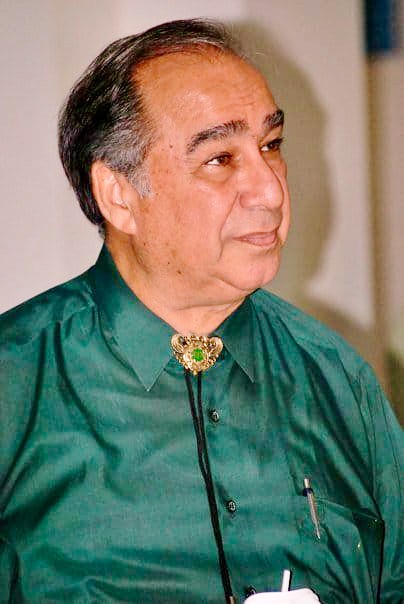
B. Afshín
Krishnan did indicate to Afshin that his mother tongue was Telugu and was not so fluent in the Tamil language. He also indicated that he would be more useful in Andhra Pradesh where Telugu is widely spoken. Afshin took note of that. One day, Krishnan told Afshin that there were a few youths who planned to go to the interiors of Andhra Pradesh to teach in a tribal village called Warangaland indicated his interest in joining them. With the blessing of Afshin, off went Krishnan to that village in an old jeep. That place is far and the terrain was challenging. When they reached Warangal, they realised that it was a difficult place to stay. Being a very remote village, it lacked basic facilities, the people were severely disadvantaged, and hygiene was completely lacking. Krishnan had a hard time living in this village, somewhat worse than what he had experienced in Karaikal. He also became sick many times during his stay there. Adding salt to injury was his inability to consume the local food which was extremely spicy. Krishnan had to eat plain rice with bananas. This went on for a while and Krishnan became weaker and weaker. He never disclosed to anyone his deteriorating health condition for fear that he would be dissuaded from serving in India and asked to return to Singapore. The Bahá’ís asked him to go back to Hyderabad to regain his health, but Krishnan refused saying he needed to be there until the end of the plan as he had pledged.
UNTIMELY PASSING
But now he has become so sick that he had to be brought to the University Hospital. He was diagnosed with internal . At this point, he was not able to talk anymore as he was very weak. But his weak body did not deter his spirit from teaching. At the hospital, Krishnan kept some Bahá’í pamphlets under his pillow and gave one to the doctor or nurse who came to his bedside to check on him. His condition worsened over a period of two weeks. On 6 December 1975, Krishnan’s precious soul winged its flight to his Beloved. When clearing his battered suitcase, they found only Bahá’í books and notebooks containing quotations from the Bahá’í Writings and carefully transcribed prayers.
The Bahá’ís were swift to act when informed of his untimely passing. His body was buried at the Bahá’í burial ground at Parsigutta, Ramnagar, Secunderabad, Telangana State, following a simple and yet befitting Bahá’í funeral service conducted by the Local Spiritual Assembly of the Bahá’ís of Hyderabad and Secunderabad.
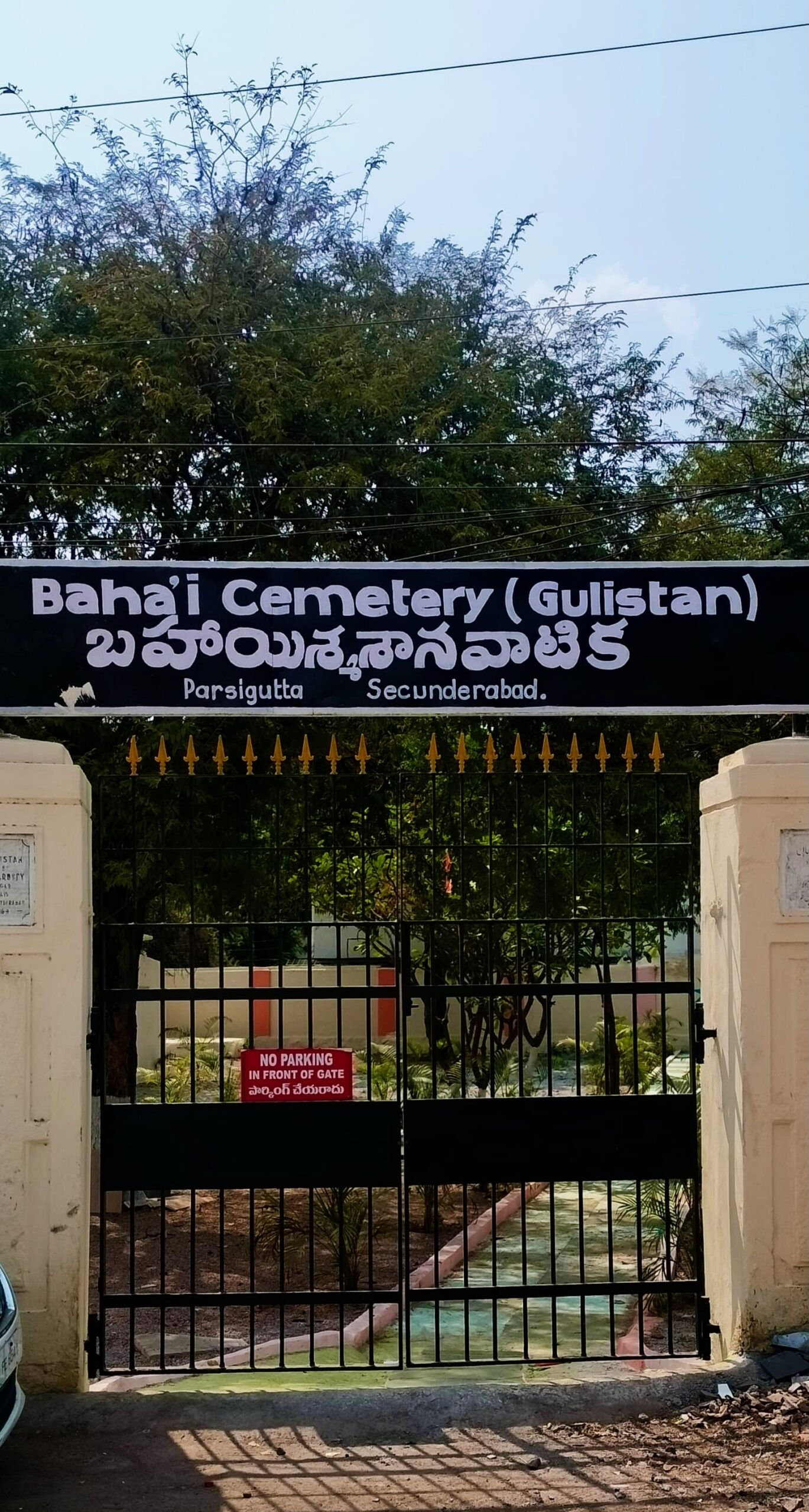
Entrance Gate to the Bahá’í Burial Ground.
Krishnan made history by being the first to be buried in this Bahá’í Burial Ground. These words are inscribed on his tombstone: “DEVOTED BRAVE AND STEADFAST PIONEER”
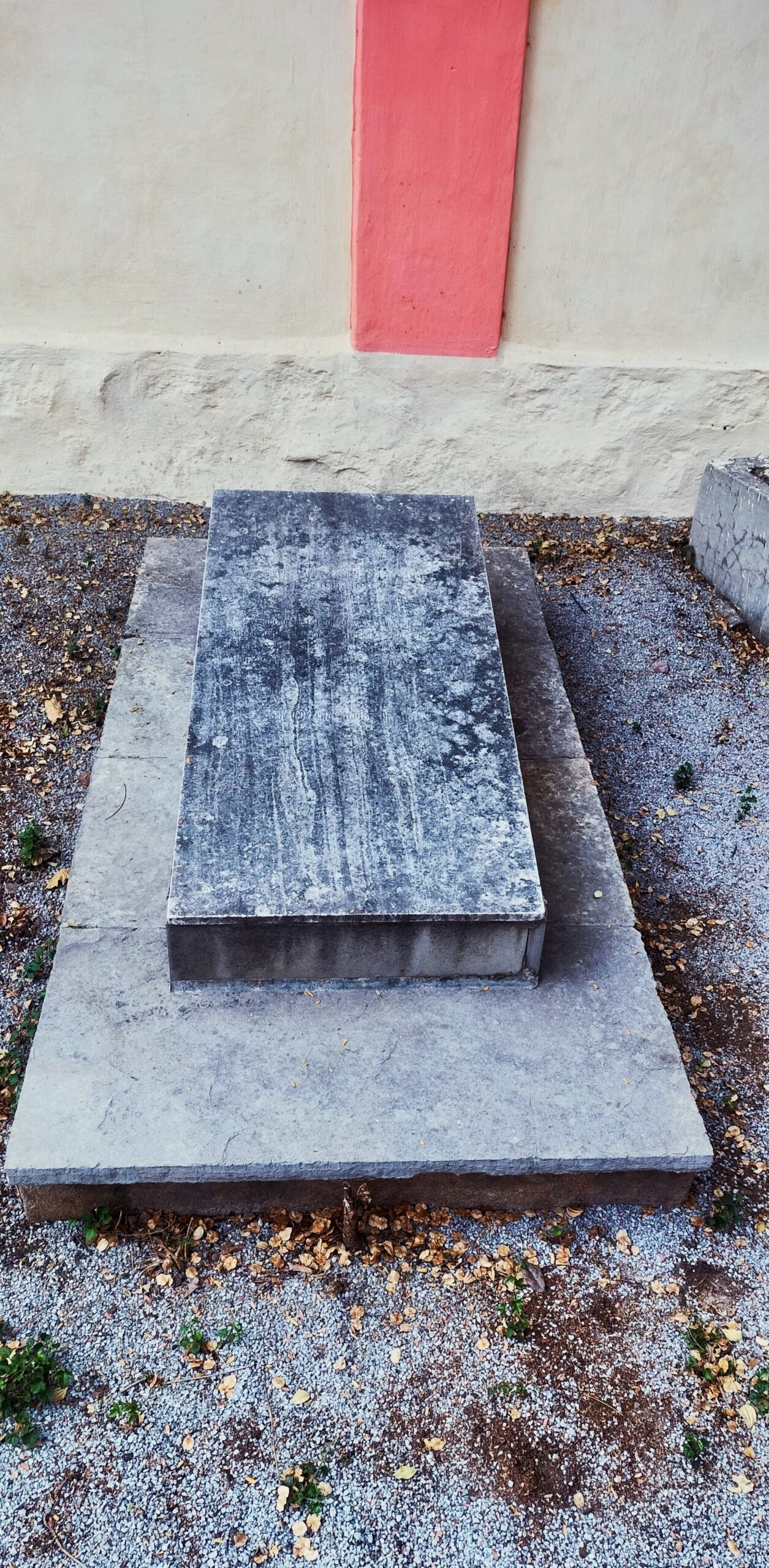
Final resting place of a “devoted, brave and steadfast pioneer”.
The National Spiritual Assembly of India wrote at the time of his passing:
“Mr. Krishnan served the Faith most diligently and sincerely . . . He was a young man . . . full of enthusiasm, devotion and love for Bahá’u’lláh and had dedicated his life to the service of the Faith. In spite of the offer of a good job in Singapore he preferred to continue his full-time services in India and had informed the National Assembly that till the end of the Five Year Plan he would not leave his post”.
The Universal House of Justice wrote on 22 December 1975:
“We were grieved to learn of the passing of the devoted, brave and steadfast pioneer, Mr. S. Krishnan. His passing in the field of service to the Cause of God no doubt will confer upon him a special bounty, which will be a cause of the progress of his soul in the eternal Kingdom of God. In his lifetime he has established a link between the Bahá’í communities in India and Singapore. His passing will further strengthen this bond of love and co-operation between your two countries. Please convey our deepest sympathy to his relatives and friends in Singapore and in India. We shall offer prayers at the holy Shrines that the mercy of Bahá’u’lláh may rest upon his soul”.
The National Spiritual Assembly of the Bahá’ís of Singapore issued a STOP PRESS announcement in its newsletter for the Feast of Sharaf 132 B.E. that read as follows:
“We have just received confirmation of the sad news of that our beloved brother S. Krishnan has passed into the Abha Kingdom on December 6 in Hyderabad, India after a short illness. This news is sudden and shocking: he was due to return next year. We all know Krishnan affectionately called “banana” man, quiet and hardworking. He did not mind being called that and often joked about it: “Where are my bananas?” Krishnan can always be remembered carrying his black bag visiting doctors selling medicine, but we knew his bag was more than half-filled with Bahá’í pamphlets, invitations and books. Before selling medicine he would talk of the Faith first and bring out pamphlets etc. After years of quiet visiting, consolidation especially in Katong, he decided to pioneer in India last year. Krishnan declared on January 1971 and from then on he spared nothing, giving everything for the Faith. He died at the prime age of 31 and a large gathering was at his Bahá’í funeral. We all remember you Krishnan and will pray for you.”
The National Spiritual Assembly of the Bahá’ís of Singapore did organize a memorial prayer session for him on 4 January 1976 at its Bahá’í Centre.
Thus ended the life of an illustrious Bahá’í pioneer whose bones are today buried in his pioneering post. He is the first to have established this spiritual link, as a pioneer between Singapore and India. Krishnan’s is a tale of pure love for the Blessed Beauty. He gave his all for this Blessed Beauty. He was like a moth that got attracted to the fire of the love of Bahá’u’lláh and ended its life in that fire. It goes without saying that the moment Krishnan accepted the Faith, his Creator had turned him from a mere pebble into a priceless jewel. Bahá’u’lláh came to bring a new race of men, and Krishnan is of that calibre. Krishnan’s sacrifice and his incessant and splendid endeavors are examples that time can never dim. His name shall forever shine on the pages of Bahá’í history.
“How often … have the lowliest adherents of the Faith, unschooled and utterly inexperienced, and with no standing whatever, and in some cases devoid of intelligence, been capable of winning victories for their Cause, before which the most brilliant achievements of the learned, the wise, and the experienced have paled.”
– Shoghi Effendi, The Advent of Divine Justice.
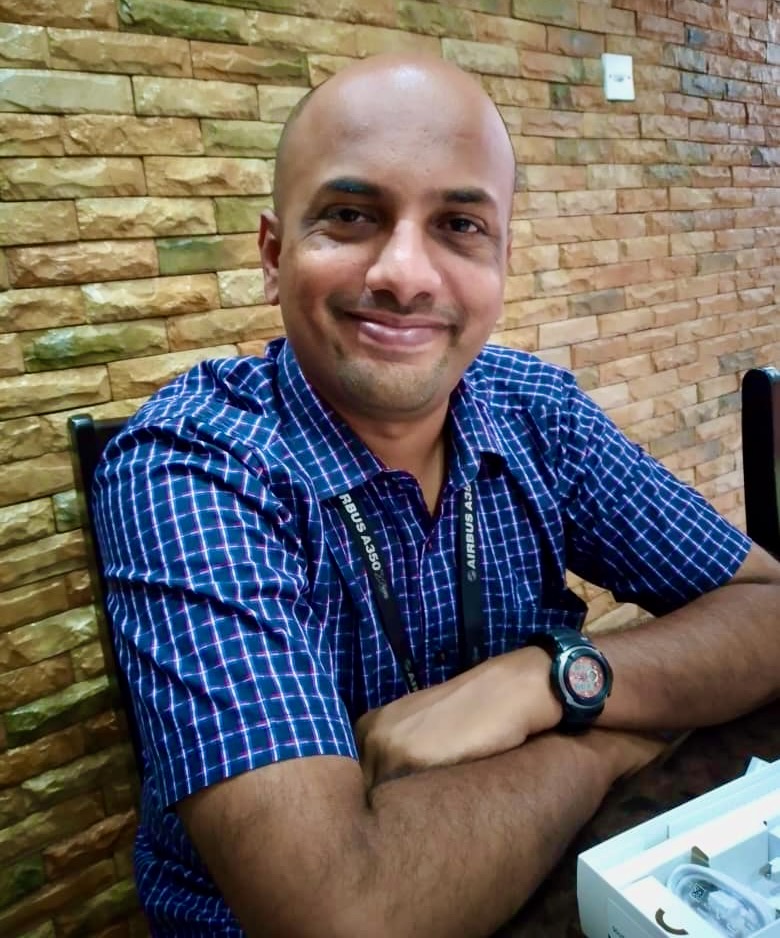
Gobinathan Gopal
Sepang
Malaysia
31 March 2024
SOURCES:
Bahá’í World Volume XVI (1973- 1976), page 563
National Spiritual Assembly of the Bahá’ís of Singapore
Talk by Mr. Afshin, India
Mr. Simon Chandrasekaran, Tanzania
Mr. Jaya Raju Thota, Greater Visakhapatnam, Andhra Pradesh, India
Mr. A. Manisegaran, USA
Copyright©bahairecollections.com
You may leave your comments at:
info@bahairecollections.com
